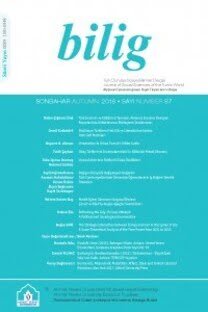Serbest Ticaret, Ekonomik Özgürlükler ve Refah
Free Trade, Economic Freedoms and Prosperity
___
Acar, Mustafa (2005). Piyasa Devlet ve Müdahale. Ankara: Orion Yay.(2004). "İktisadın Ezeli Sorunsalı: Serbest Ticaret mi, Korumacılık mı?" Piya- sa. Bahar 2004, 3 (10): 1-23.
Akalın, G. (2002). Türkiye'de Piyasa Ekonomisine Geçiş ve Ekonomik Kriz. TİSK Yay. www.tisk.org.tr/yayinlar.asp?s=6# (21.10.2008).
Aktan, Coşkun Can (1998). "Devlet Müdahalesi ve Ekonomik Özgürlükler". EGİAD Raporu. İzmir.
Bastiat, Fréderic (1997). Hukuk. Çev. Yıldıray Arsan. 2. Baskı. Ankara: Liberte Yay.
(1996). Economic Sophisms. Eng. trans. by A. Goddard. 5th printing. New York: Irvington-on-Hudson.
Baldwin, Robert E. (1969). "The Case Against Infant-Industry Tariff Protection". Journal of Political Economy. Vol. 77: 295-305.
Bauer, Peter T. (1972). Dissent on Development. Cambridge MA: Harvard University Press.
Berger, Peter L. (1987). The Capitalist Revolution. New York: Basic Books.
Beşkaya, Ahmet ve Asuman Koç (2006). "Ekonomik Büyüme ve Kalkınmada Eko- nomik Özgürlüklerin Rolü ve Önemi". Liberal Düşünce 43: 43-74.
Bovard, James (1992). The Fair Trade Fraud. New York: St. Martin's Press.
Caves, Richard E., Jeffrey A. Frankel ve Ronald W. Jones (1996). World Trade and Payments, 7th ed. New York: Harper Collins College Publishers.
Demir, Ömer ve Mustafa Acar (2005). Sosyal Bilimler Sözlüğü. 6. baskı. Ankara: Adres Yay.
Doing Business (DB): Measuring Business Regulations. www.doingbusiness.org/ EconomyRankings/
Environmental Performance Index 2008. sedac.ciesin.columbia.edu/es/epi.
Freedom House. Freedom in the World 2006. www.freedomhouse.org/ template.cfm?page=15&year=2006 (18.10.2008).
Friedman, Milton ve Anna Jacobson Schwartz (1963). A Monetary History of the United States: 1867-1960. Princeton NJ: Princeton Univ. Pres and NBER.
Griswold, Daniel (2001). Seven Moral Arguments for Free Trade. Cato Institute. Center for Trade Policy Studies. www.freetrade.org (30.09.2008).
Grubel, Herbert G. (1981). International Economics. Homewood. IL: Richard D. Irwin Inc.
Gwartney, James D. ve Robert Lawson (2001). Economic Freedom of the World, Annual Report 2001. Vancouver: Fraser Institute.
Gwartney, James ve Robert Lawson ve Seth Norton (2008). Economic Freedom of the World: 2008 Annual Report. Canada: Economic Freedom Network. www.freetheworld.com (23.10.2008).
Gwartney, James D. ve Robert Lawson (2006). Economic Freedom of the World. New Delhi: Centre for Civil Society.
(The) Heritage Foundation (2009). 2009 Index of Economic Freedom. www.heritage.org/Index/Ranking.aspx) (10.09.09)
International Country Risk Guide (ICRG). www.prsgroup.com/ICRG.aspx
Kasper, Wolfgang (2007). Ekonomik Özgürlük ve Gelişme: Mülkiyet Hakları. Rekabet ve Refah Üzerine Bir İnceleme. Çev. B. Akın. Ankara: Liberte Yay.
Kasper, Wolfgang ve Manfred E. Streit (1998). Institutional Economics: Social Order and Public Policy, John Locke Series, Cheltenham: Edward Elgar.
Krueger, Anne O (1974). "The Political Economy of the Rent-seeking Society". American Economic Review 64: 291-303.
Stefan Melnik (2006). Özgürlük, Refah ve Demokrasi Mücadelesi. Çev. A. Yayla. Ankara: Liberte.
Moore, Stephen ve Julian L. Simon (2003). "Son 100 Yılda ABD'de Yirmi beş Muci- zevi Gelişme". I. Vasquez (ed.). Kapitalizm ve Küresel Refah. Çev. M. Toprak, M. Doğanlar, E. Erdem. Ankara: Liberte.
Oğuz, Fuat (2003). Mülkiyet Hakları: Bir Ekonomik Analiz. Ankara: Roma Yay.
O'Driscoll, Gerald P., Kim R. Holmes ve Melanie Kirkpatrick (2002). 2002 Index of Economic Freedom. Washington-New York: Heritage Foundation-Wall Street Journal.
Reed, Lawrence W. (2001). Seven Principles of Sound Public Policy. Detroit, Michigan: Mackinac Center for Public Policy. [Türkçesi: (2008) "Sağlam Ka- mu Politikasının Yedi İlkesi". Çev. M. Acar. Liberal Düşünce 50: 213-222.]
Roberts, Russell D. (2001). The Choice: A Fable of Free Trade and Protectionism. 2nd ed. New Jersey: Prentice Hall.
Seyidoğlu, Halil (2007). Uluslararası İktisat. 16. Baskı. İstanbul: Güzem Can Yay.
Scully, Gerald W. (1992). Constitutional Environments and Economic Growth. Princeton: Princeton University Press.
Transperancy International, Corruption Perception Index 2007. www.transparency.org/policy_research/surveys_indices/cpi/2007 (13.08.2008).
Ünsal, Erdal (2005). Uluslararası İktisat. Ankara: İmaj.
World Bank (2008). World Development Indicators. www.worldbank.org
World Economic Forum. The Global Competitiveness Report (GCR) 2008. www.weforum.org/en/initiatives/gcp/index.htm (13.08.2008).
Yereli, Ahmet Burçin (2003). Ekonomik Özgürlükler ve Türkiye'de Devlet-Birey İlişkisi. Ankara: Gazi Kitabevi.
- ISSN: 1301-0549
- Yayın Aralığı: 4
- Başlangıç: 1996
- Yayıncı: Ahmet Yesevi Üniversitesi Mütevelli Heyet Başkanlığı
Fatma Aliye Hanım ang historiography
İşe Bağlılığı Etkileyen Faktörler: İmalat ve Hizmet Sektörlerinde Karşılaştırmalı Bir Analiz
Ayşe KURUÜZÜM, SEZGİN IRMAK, Emre ÇETİNİPEKÇİ
Osmanlı İktidar Anlayışı Çerçevesinde Şiir
Serbest Ticaret, Ekonomik Özgürlükler ve Refah
Halaççanın Yitim ve Değişim Sürecine Tasarlama Kipleri Açısından Bir Bakış
Çağdaş Uygur İslam düşüncesinin önderi Abdulkadir Damolla
